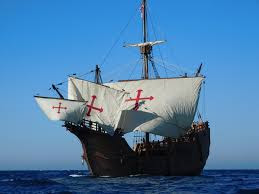In 1492, Columbus sailed the ocean blue…
 |
| Replica of Columbus’s ship, the Santa Maria |
Ah, the jingle we all learn at school. Making 1492 almost as memorable to British schoolkids as 1066 and the Norman invasion of England. But Columbus did more than sail the ocean.
To this day, Spain’s national day is 12 October, supposedly the anniversary of Columbus’s ‘discovery’ of the New World (in quotation marks because I assume the people who were already living there didn’t feel he’d discovered the place. Nor would they have seen much to celebrate in the event).
That day is also celebrated in much of the Americas, even the US, where it’s explicitly referred to as ‘Columbus Day’.
It’s that important because it marks the ascent of Spain to the status of world power. The primary world power of its time. The head of perhaps the greatest Empire the world had seen up to then, an Empire on which the sun never set. It stretched from the Philippines to the Americas, and quite a lot in between. Even in Europe, the Spanish holdings were massive: a lot of Italy, bits of France and Germany, and the whole of the Low Countries (present day Benelux).
It was true that it was always daylight somewhere in the Spanish Empire.
Of course, that isn’t always such a good thing. It was later true of the British Empire that the sun never set on it, but Duncan Spaeth, a bright commentator in the US commented, “I know why the sun never sets on the British Empire: God would never trust an Englishman in the dark.”
Spin had the muscle to back up its status. The ‘tercios’ were the most feared infantry units in Europe, virtually unstoppable on battlefields, and it had redoubtable maritime forces, to service its overseas imperial possessions.
And then it lost it all. At the Battle of Trafalgar, at the start of the nineteenth century, the best of the Spanish fleet was destroyed, alongside its French allies. In the course of the following decades, most of its American colonies fought and won their independence, until by the end of the century its only substantial possessions were Cuba in Latin America and the Philippines in Asia. Then it fell out with the new upstart nation on the world stage, the United States, which sank the weakened navy it still had, and relieved it of Cuba, the Philippines, Puerto Rico and Guam.
 |
| America justifies its its toasting of Spain |
Things hadn’t gone well at home either. The decision as to who should be King would be determined by fighting between foreign powers – Britain and Austria on the one hand, France on the other – at the start of the eighteenth century. At the start of the nineteenth, Napoleon would put a brother of his on the throne. Meanwhile, instability and war had reduced the country to poverty and backwardness. Where once it had called the shots in Europe, it was now the victim of other nations’ bullying.
What went wrong? How come in 400 years Spain could go from straddling the globe to suffering poverty and defeat as a third-rate European power?
You don’t have to look far to find the answer. The Church imposed a regime of solidly enforced ignorance on the people. When France, Britain, and many states of Northern Europe were driving science forward, and building new technology on it, the Inquisition made sure that such dangerous ideas were given no opportunity to grow in Spain.
In parallel, a class of super-wealthy nobles ensured that the unbelievable levels of wealth extracted from the Empire maintained essentially themselves. They owned huge holdings of land and lived off them. They paid little or no tax themselves but enforced payment of backbreaking sums from those poorer than themselves. Just as the Spanish Church prevented enlightenment ideas from spreading into the development of new ideas and techniques, so the Spanish elites ensured that no significant investment would be made in new industries and wealth-creation generally.
The result? There was neither the will nor the means to do what was necessary to preserve Spanish pre-eminence. For instance, to replace the fleet lost at Trafalgar.
Spain lost its status as a world power because its domestically powerful weren’t ready to embrace any change that threatened their lifestyle. And so they, and the rest of the people, lost the lot in the end.
Why is this worth reflecting on? Because I believe that the same happened to Britain. It replaced Spain as a nation of colossal power in the world. But then it couldn’t adapt to new circumstances or accommodate the changes in society needed to make the nation fit for a different world. It had the chance to embrace a powerful new role in 1970s, as a major player in a powerful world bloc, the EU. But, as nostalgic as the Spanish always were for a supposedly glorious past that was rapidly slipping away, Britain then left in 2016. Like Spain before it joined the EU, it will become a third-rate power struggling to make its voice heard.
And even more important than Britain, what now is happening to the US? As Trump has alienated nation after nation, he can no longer pull together a coalition, for instance for his quarrel with China. Like the Spanish leaders of the eighteenth and nineteenth century, he is fixated with a past that is vanishing. That leaves him incapable of dealing with a future that is careering down the track towards him.
It happened to Spain. It happened to Britain. If the US sticks with Trump, we may well see his people Making America Small Again.
No comments:
Post a Comment